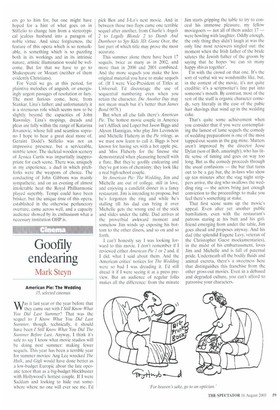Force for good
Michael Tanner
Stiffelio Holland Park Stiffelio has been one of my favourite lesser-known Verdi operas since I saw its first revival in modern times in Parma at the end of 1968. It was an almost singalong audience, highly discriminating about the virtues of the singers, and quite willing to be disapproving of a performer the moment that he or she departed from the standards previously set. In the intervals there was local wine from the barrel. In the afternoon I had visited Verdi's birthplace in Le Roncole, climbed up and looked round the room whose walls were covered with tributes from Verdi societies; and had put my hands on the keys of the church organ that the ten-year-old Verdi had been appointed to play. The small-town ambience still seems to me overpoweringly present in his works until the great trio of masterpieces that begins with Rigoletto in 1851, the year after Stiffelio: and though it's now a banality to say that, and to rebut it, I have usually found myself enjoying performances of the earlier works that aren't starry and don't take place in the world's great opera houses more than ones that, as soon as they contain big names,
immediately come to seem to be vehicles for them.
That is one reason why Opera Holland Park's production of Stiffelio is so intensely enjoyable. As one now expects from that institution, the performance is in all ways fully professional, but with the rare exception few people would go for the specific performers rather than for the work. I now have high expectations of the productions, and have yet to be disappointed. The musical standards both of Welk) and of L'Arlesiana earlier in the season have easily equalled many of the things I've seen in the last season in London's two opera houses. The casts seem to consist mainly of singers on the way up, or veterans (a mildly coded term).
In this tale of adulterous passion, where the emphasis is on the betrayed husband and his seduced wife, the vocal interest is shared between them but her father has a still larger role, and on the whole more impressive music. As so often Verdi seems happier writing duets for a soprano and a baritone rather than soprano and tenor: interesting that he didn't take the final step, an obvious one, one would have thought, and have baritones as his romantic leads. But then though he was interested in passionate relationships, he was more interested in the forces, either within the parties concerned or from outside of them, that undermine those relationships. Passion itself is not something he seems impelled to explore, as Monteverdi and Mozart and Wagner obsessively do.
When Stiffelio opens, the illicit liaison between Lina and Raffaele is already over, though Raffaele wants it to continue. Lina is overcome with remorse, and spends most of the opera pleading with the other characters. Stiffelio himself, a 'sectarian' minister, is first outraged and furious when he finds out about his wife's adultery, then, in the remarkable and extremely brief final scene, he reads from the Bible to his congregation about forgiveness and proceeds, in a most unusual way, to put it into practice. No wonder the censors were upset; and perhaps no wonder that Verdi doesn't know what to do then other than bring the curtain down sharply. Psychological probings aren't what his most fanatical adrnir ers go to him for, but one might have hoped for a hint of what goes on in Stiffelio to change him from a stereotypical jealous husband into a paragon of noble virtue. And since forgiveness, the feature of this opera which is so remarkable, is something which is so puzzling both in its workings and in its intrinsic nature, artistic illumination would be welcome. But for that we have to go to Shakespeare or Mozart (neither of them evidently Christians).
For Verdi we go, at this period, for plaintive melodies of anguish, or energisingly urgent passages of resolution or fury. The most furious come, here, from Stankar. Lina's father; and unfortunately it is a strenuous role which seems now to be slightly beyond the capacities of John Rawnsley. Lina's mopings, dreads and pleas are fully within the range of Katarina Jovanovic, whose full and seamless soprano I hope to hear a great deal more of. Geraint Dodd's Stiflelio was not an impressive presence, but a serviceable, nimble tenor. The skeletal wooden scenery of Jessica Curtis was impartially inappropriate for each scene. There was, uniquely in my experience, a duel in which pitchforks were the weapons of choice. The conducting of John Gibbons was mainly sympathetic, and on an evening of almost intolerable heat the Royal Philharmonic played superbly. Tempi could have been brisker, but the unique tinta of this opera, established in the otherwise perfunctory overture, came across well, and a capacity audience showed by its enthusiasm what a necessary institution OHP is.











































































 Previous page
Previous page